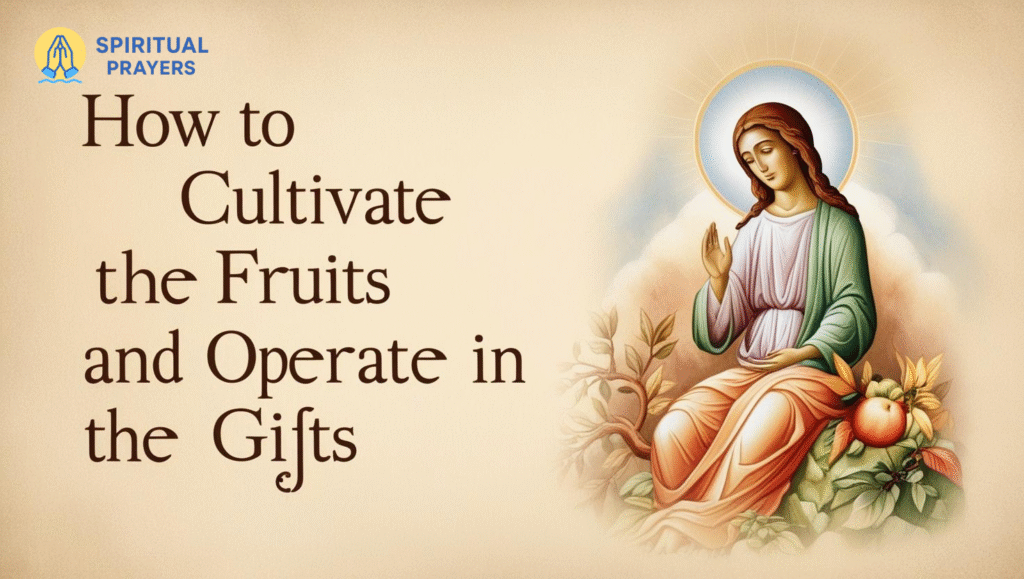
The Fruits and Gifts of the Holy Spirit are foundational concepts in Christian theology, offering believers spiritual tools and virtues to live a life aligned with God’s will. These divine attributes, bestowed through the Holy Spirit, empower individuals to grow in faith, serve others, and reflect Christ’s character. This article provides an in-depth exploration of the Fruits and Gifts of the Holy Spirit, their meanings, biblical origins, and practical applications in daily life. Whether you’re seeking to deepen your spiritual understanding or apply these principles, this guide offers clarity and inspiration.
What Are the Fruits of the Holy Spirit?

The Fruits of the Holy Spirit are virtues or qualities that manifest in a believer’s life through the transformative work of the Holy Spirit. These attributes reflect God’s character and are evidence of a life rooted in faith. According to Galatians 5:22-23, the Fruits are love, joy, peace, patience, kindness, goodness, faithfulness, gentleness, and self-control. Each fruit represents a tangible outcome of spiritual growth, shaping how believers interact with God, themselves, and others.
Love: The Foundation of All Virtues
Love, or agape in Greek, is selfless, unconditional love that mirrors God’s love for humanity. It transcends emotions, focusing on actions that prioritize others’ well-being. In John 13:34-35, Jesus commands believers to “love one another as I have loved you,” emphasizing love as a hallmark of discipleship. Practically, love manifests in acts of compassion, forgiveness, and sacrifice, such as volunteering time to help those in need or offering support during difficult times.
Joy: A Deep-Seated Delight in God
Joy is a profound sense of gladness rooted in God’s presence, not dependent on external circumstances. Unlike fleeting happiness, joy endures trials, as seen in James 1:2-3, which encourages believers to “consider it pure joy” when facing challenges. This fruit enables Christians to maintain hope and gratitude, whether through worship, prayer, or sharing positivity with others, even in adversity.
Peace: Inner Calm Amid Chaos
Peace is the tranquility that comes from trusting God’s sovereignty. Jesus promises this peace in John 16:33, stating, “In me, you may have peace.” It allows believers to remain calm during conflicts or uncertainties, fostering reconciliation and harmony in relationships. Practicing peace might involve meditative prayer or resolving disputes with humility and understanding.
Patience: Endurance with Grace
Patience, or forbearance, is the ability to endure difficulties without frustration or complaint. Colossians 3:12 urges believers to “clothe yourselves with patience,” reflecting God’s patience with humanity. This fruit is evident when someone waits graciously during delays or responds calmly to provocation, cultivating resilience and empathy.
Kindness: Compassion in Action
Kindness is the active expression of care and goodwill toward others. Ephesians 4:32 encourages believers to “be kind and compassionate to one another.” Simple acts like offering a listening ear, helping a neighbor, or showing empathy to a stranger embody kindness, creating a ripple effect of positivity in communities.
Goodness: Moral Integrity and Generosity
Goodness reflects moral uprightness and a desire to do what is right. It involves living with integrity and generosity, as seen in Psalm 23:6, where “goodness and mercy” follow God’s people. Goodness might manifest in ethical decision-making, charitable giving, or standing up for justice, aligning actions with God’s truth.
Faithfulness: Steadfast Loyalty to God
Faithfulness is unwavering commitment to God and His promises. Hebrews 11:1 defines faith as “confidence in what we hope for and assurance about what we do not see.” This fruit is displayed through consistent prayer, obedience to scripture, and loyalty in relationships, such as honoring commitments to family or community.
Gentleness: Strength Under Control
Gentleness, often called meekness, is strength tempered by humility and compassion. Jesus describes Himself as “gentle and humble in heart” in Matthew 11:29. This fruit is evident in soft-spoken correction, nurturing care, or handling conflits with grace, ensuring others feel valued and respected.
Self-Control: Mastery Over Desires
Self-control is the discipline to resist temptation and align actions with God’s will. Proverbs 25:28 compares a lack of self-control to a “city whose walls are broken through.” This fruit empowers believers to overcome destructive habits, such as managing anger, avoiding gossip, or practicing moderation in daily life.
What Are the Gifts of the Holy Spirit?

The Gifts of the Holy Spirit are supernatural abilities granted to believers to serve the Church and advance God’s kingdom. Listed in 1 Corinthians 12:8-10, these gifts include wisdom, knowledge, faith, healing, miracles, prophecy, discernment of spirits, tongues, and interpretation of tongues. Unlike the Fruits, which are universal virtues, the Gifts are distributed uniquely to individuals for specific purposes.
Wisdom: Divine Insight for Decision-Making
The gift of wisdom provides supernatural insight to apply God’s truth to complex situations. It goes beyond human understanding, guiding believers to make decisions that honor God. For example, a church leader might use wisdom to counsel a struggling member, offering solutions grounded in scripture and discernment.
Knowledge: Understanding God’s Truth
The gift of knowledge grants deep insight into spiritual truths, often through revelation. This gift enables believers to comprehend scripture or discern God’s will in specific contexts. A teacher with this gift might explain biblical concepts with clarity, helping others grow in faith.
Faith: Extraordinary Trust in God
The gift of faith is an exceptional confidence in God’s power, enabling believers to trust Him for miraculous outcomes. This gift is evident in bold prayers for healing or provision, as seen in the lives of biblical figures like Abraham, who trusted God’s promise despite impossible odds (Romans 4:20-21).
Healing: Restoring Body and Soul
The gift of healing empowers believers to restore physical, emotional, or spiritual health through God’s power. Acts 3:6-8 recounts Peter healing a lame man, demonstrating this gift. Today, it might manifest in prayer for recovery or counseling that brings emotional wholeness.
Miracles: Supernatural Acts of God
The gift of miracles involves extraordinary acts that defy natural laws, such as raising the dead or multiplying resources. John 6:11 describes Jesus feeding thousands with a few loaves and fish, a clear miracle. Modern examples include unexplained recoveries or divine interventions in crises.
Prophecy: Proclaiming God’s Message
Prophecy is the ability to speak God’s message, often revealing future events or offering divine guidance. In Acts 21:10-11, Agabus prophesied Paul’s imprisonment. Today, prophecy might involve sharing a timely word of encouragement or warning, always aligned with scripture.
Discernment of Spirits: Identifying Spiritual Influences
The gift of discernment distinguishes between divine, human, or demonic influences. 1 John 4:1 urges believers to “test the spirits” to ensure they are from God. This gift helps protect the Church from false teachings or deceptive influences, ensuring spiritual purity.
Tongues: Speaking in Unknown Languages
The gift of tongues involves speaking in languages unknown to the speaker, often for prayer or worship. Acts 2:4 describes the apostles speaking in tongues at Pentecost. This gift fosters intimate communion with God or communicates His message across cultures when interpreted.
Interpretation of Tongues: Translating Divine Messages
The gift of interpretation translates messages spoken in tongues, making them edifying for the Church. 1 Corinthians 14:27-28 emphasizes the need for interpretation to ensure clarity. This gift ensures that tongues serve a communal purpose, building up the body of Christ.
How to Cultivate the Fruits and Operate in the Gifts

Cultivating the Fruits and operating in the Gifts requires intentional spiritual practices and reliance on the Holy Spirit. Here are practical steps to nurture these divine attributes:
- Prayer and Meditation: Regular prayer opens your heart to the Holy Spirit’s guidance, fostering virtues like peace and patience. Pray specifically for the Fruits to grow and the Gifts to manifest.
- Scripture Study: Immersing yourself in God’s Word builds knowledge and wisdom, equipping you to discern and apply spiritual truths.
- Community Engagement: Serving in a church or small group allows you to practice kindness, faithfulness, and gentleness while discovering your spiritual gifts.
- Worship and Surrender: Worship aligns your heart with God, cultivating joy and self-control. Surrendering to God’s will activates the Gifts for His purposes.
- Accountability: Partner with mentors or peers to reflect on your growth in the Fruits and encourage responsible use of the Gifts.
Biblical Examples of Fruits and Gifts in Action
Scripture provides vivid examples of the Fruits and Gifts at work. The Good Samaritan (Luke 10:25-37) displayed love, kindness, and goodness by caring for a stranger. Stephen, in Acts 6:8-15, operated in wisdom and miracles, boldly proclaiming God’s truth despite persecution. Paul’s missionary journeys showcased prophecy and discernment, guiding the early Church through divine revelation. These stories inspire believers to emulate these qualities and seek the Holy Spirit’s empowerment.
Practical Applications in Modern Life
The Fruits and Gifts remain relevant today, transforming personal lives and communities. A parent practicing patience during a child’s tantrum reflects the Fruits, while a pastor delivering a prophetic word during a sermon operates in the Gifts. In workplaces, kindness and self-control foster healthy relationships, while wisdom and discernment guide ethical decisions. By living out these attributes, believers become witnesses of God’s grace, drawing others to faith.
Common Misconceptions About the Fruits and Gifts
Misunderstandings about the Fruits and Gifts can hinder spiritual growth. Some believe the Fruits are natural traits, but they are divinely cultivated through the Holy Spirit. Others view the Gifts as exclusive to certain believers, yet 1 Corinthians 12:7 states they are given “for the common good” of all. Additionally, the Gift of tongues is sometimes overemphasized, but Paul prioritizes prophecy and love (1 Corinthians 14:1). Clarifying these misconceptions ensures a balanced approach to spiritual development.
The Role of the Holy Spirit in Christian Life
The Holy Spirit is the source of both Fruits and Gifts, indwelling every believer at salvation (Romans 8:9). As the third person of the Trinity, the Holy Spirit empowers, guides, and sanctifies, enabling Christians to live out God’s calling. The Fruits reflect the Spirit’s transformative work in character, while the Gifts demonstrate His power through service. Together, they equip believers to fulfill the Great Commission (Matthew 28:19-20) and glorify God.
Conclusion: Living a Spirit-Filled Life
The Fruits and Gifts of the Holy Spirit are divine tools for spiritual growth and ministry. By cultivating virtues like love, joy, and self-control, believers reflect God’s character in their daily lives. By operating in gifts like wisdom, healing, and prophecy, they serve the Church and advance God’s kingdom. Through prayer, scripture, and community, anyone can deepen their connection to the Holy Spirit, living a life that bears eternal fruit and impacts the world for Christ.